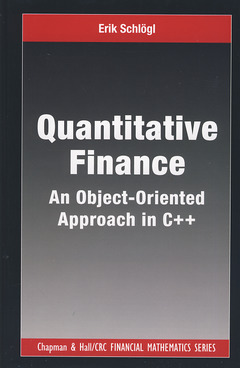Quantitative Finance An Object-Oriented Approach in C++ Chapman and Hall/CRC Financial Mathematics Series
Auteur : Schlogl Erik

Quantitative Finance: An Object-Oriented Approach in C++ provides readers with a foundation in the key methods and models of quantitative finance. Keeping the material as self-contained as possible, the author introduces computational finance with a focus on practical implementation in C++.
Through an approach based on C++ classes and templates, the text highlights the basic principles common to various methods and models while the algorithmic implementation guides readers to a more thorough, hands-on understanding. By moving beyond a purely theoretical treatment to the actual implementation of the models using C++, readers greatly enhance their career opportunities in the field.
The book also helps readers implement models in a trading or research environment. It presents recipes and extensible code building blocks for some of the most widespread methods in risk management and option pricing.
Web ResourceThe author?s website provides fully functional C++ code, including additional C++ source files and examples. Although the code is used to illustrate concepts (not as a finished software product), it nevertheless compiles, runs, and deals with full, rather than toy, problems. The website also includes a suite of practical exercises for each chapter covering a range of difficulty levels and problem complexity.
Erik Schlögl currently is Professor and Director of the Quantitative Finance Research Centre at the University of Technology, Sydney (UTS), Australia. Erik received his doctorate in Economics from the University of Bonn, Germany, for work on term structure models and the pricing of fixed income derivatives and has gained broad-based experience in computational financial engineering. He has consulted for financial institutions and software developers in Europe, Australia and in the US. His research interests cover a broad area of quantitative finance, in particular model calibration, interest rate term structure modelling, credit risk and the integration of multiple sources of risk. He has published articles in a number of international journals, including Finance & Stochastics, Quantitative Finance, Risk and the Journal of Economic Dynamics and Control. In addition to UTS, he held positions at the University of New South Wales, Australia, and the University of Bonn, Germany.
Date de parution : 11-2013
Ouvrage de 506 p.
15.6x23.4 cm
Thèmes de Quantitative Finance :
Mots-clés :
Risk Neutral Densities; methods and models of quantitative finance; American Put Option Prices; computational finance; Member Function; C++ classes and templates; Underlying Asset; methods in risk management and option pricing; Risk Neutral Distribution; quantitative finance problems; Risk Neutral Probability; extensible code building blocks; Const Array; quantitative finance models; Binomial Lattice Model; functional C++ code; Risk Neutral Probability Distribution; web resource; Coupon Bond; risk management; Option Price; Inline Void; Stochastic Volatility; Int Argc; Finite Difference Methods; Binomial Lattice; Implied Volatilities; Monte Carlo Estimate; Risk Neutral Probability Measure; Namespace Std; Antithetic Sampling; Arbitrage Free Price; Instantaneous Forward Rate; Constant Dividend Yield; STL



